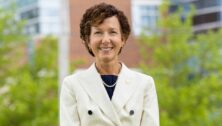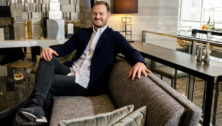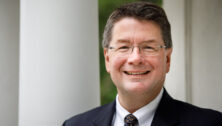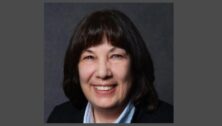Bucks County Leadership: Lance Nelson, Partner and Litigation Chair, MacElree Harvey, Ltd.
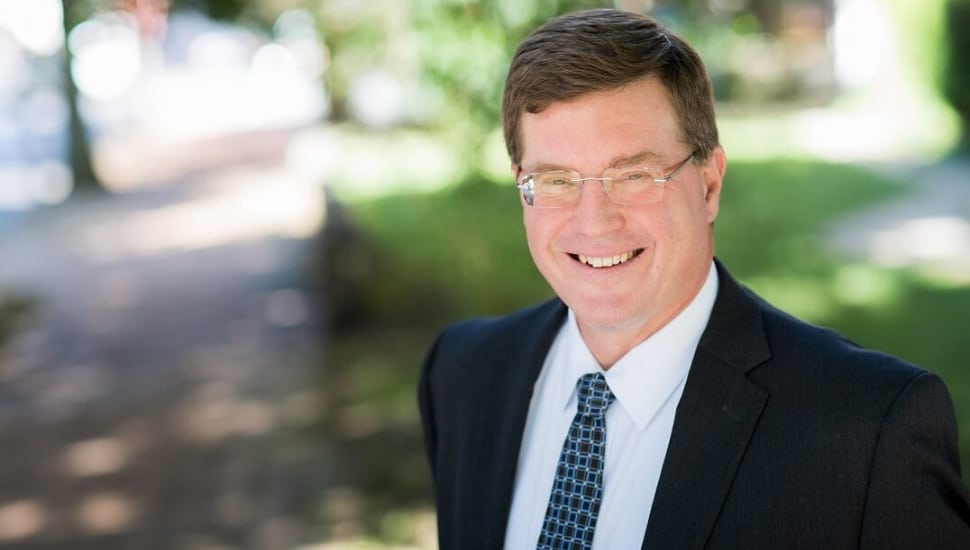
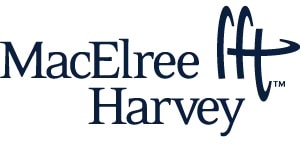
Lance Nelson, Partner and Litigation Chair at MacElree Harvey, Ltd., spoke with BUCKSCO Today about growing up in Connecticut in a duplex that his family shared with his grandparents. He recalled the sacrifices his parents made and learning the value of hard work as a janitor and a busboy.
After earning his law degree from Villanova, Nelson has spent most of his career at MacElree Harvey. He spoke about the partners who mentored him and the changes he’s made to the business side of the firm. He also discussed his volunteer work as President of the West Chester Public Library.
Where were you born, and where did you grow up?
I grew up in a town called Branford, Connecticut, which is about 10 minutes outside of New Haven. I was born on an Air Force base in Cape Cod because when I was little – my dad was in the Air Force. I lived in Cape Cod, Okinawa, and Las Vegas all before I turned four. Branford is where my mom grew up, so my parents moved in temporarily to the lower-level apartment of my grandparents’ duplex when my dad got out of the Air Force, and we never left.
You must have been close to your grandparents then.
I was. It was fun. My dad went back to school at night on the GI Bill. He worked for Pratt & Whitney his whole career. He was trained to fix airplane engines in the Air Force. My grandfather worked the night shift at the factory, at Pratt & Whitney, as well. Looking back, it was a unique experience. It was awesome. I spent more time with my grandparents than anybody else I know.
What did your mom do?
Before she had kids, she was trained as an X-ray technician. Then she was a stay-at-home mom for the longest time. When I was a freshman in college, she went back to work for a small intermediate care clinic doing X-rays and then as an office worker.
Where were you in the pecking order?
I was the oldest. I have a twin brother and sister who are two years younger than me, and my little sister is four years younger.
What memories stay with you from that unique setting in Connecticut?
The thing that defines my childhood the most is a very close-knit family and how my parents would do literally anything for us. I’ll give you an example – the downstairs apartment that we lived in had two bedrooms. Initially, we four kids had two bunk beds in one bedroom.
Around late grammar school, my parents decided it was not a good idea to have the boys and the girls in the same room, so my parents moved out of their bedroom and slept on a pull-out couch. My parents made such sacrifices for us kids.
Did you play any sports when you were young?
I played a whole bunch of sports. My primary sport was basketball which I played all the way through high school before I went to Boston College. They had a junior varsity team, but I wasn’t recruited there for anything.
What part-time jobs did you have growing up?
My grandfather got me my first job. When he retired, he was a janitor in the local school system. My first job, which went through most of the summers I was in college, was cleaning and painting schools for our school system. Then, at night, I was a busboy at a local restaurant.
What lessons did you take from those experiences that still shape how you work today?
Hard work has its rewards. Because my grandfather got me that job, there was no second thought of loafing around in that work environment or not doing what I needed to do.
The busboy experience was interesting because I had to interact with different people and different circumstances. I was interacting with the kitchen staff, the other waiters, and the customers. I learned if I worked hard and tried to do it right, people respected me.
What kind of music were you listening to in high school?
Classic rock – I was a big Springsteen guy in the ‘70s and early ‘80s. Bob Dylan, the Rolling Stones. There was a local bluesy bar band up in New England called NRBQ, which stood for the New Rhythm and Blues Quartet, that had this cultish following.
But Springsteen was probably my favorite. I’ve seen him a bunch of times, including a few recently with my wife, who is also a big fan.
Where did you end up going to college, and why there?
I went to Boston College, and the simplest answer is because I got in. I had applied to all kinds of smaller, private schools – Dartmouth, Amherst, places like that. BC and UConn were my safety schools, and I didn’t want to go to UConn. It worked out great.
I got very lucky in the sense that my freshman year at BC was Doug Flutie’s junior year. That was the year he exploded, and then he won the Heisman his senior year. The applications at BC went from about 10,000 a year to 25,000 a year.
What did you like about Boston College?
My first memory is the first Saturday I was there. I went to a football game. I didn’t know anybody. The place is going nuts, Flutie’s going nuts. I was high-fiving all these people I’d never met before.
I met a bunch of friends at BC who I still keep in touch with, including my four roommates. In October, I went to my roommate’s daughter’s wedding in Rhode Island. We could not be together for a year, and we get together, and it’s like we were never apart.
When you got done with college, how did you decide to go into law?
I always liked working with people. I was very close to doing the Jesuit Volunteer Corps out of college. Jesuit Volunteers is like the Catholic Church’s version of the Peace Corps.
I had applied to do different volunteer work throughout the United States. My then-girlfriend, now-wife, basically said, “Snap out of it. If you’re going to go to law school for three years, you’re not wasting a year in Jesuit Volunteers.”
I applied to a bunch of different law schools, and it came down to UConn, Notre Dame, and Villanova. I ultimately chose Villanova.
Villanova allowed you to develop roots in the Delaware Valley.
Absolutely. My wife was a special education teacher before our kids were born, so when I was in law school, she was teaching in the Intermediate Unit in Coatesville in a learning-disabled classroom. She liked her job and said, “I don’t want to leave. You need to find a job around here.” So, in 1990, I started interviewing around here.
My first legal job was for a small firm in Wilmington. I had this utopian vision of being a corporate litigator in Delaware. Then I realized that Delaware is a very small community.
I was there for about two years. My former law school roommate, now partner, Harry DiDonato, called me up and said, “They’re looking for somebody in our litigation department.” I met with Bill Gallagher and made a few phone calls. People said, “If you have an opportunity to work with Bill, you should take it.” I had the blessing of working with Bill on all kinds of cases over the last 30 years. He’s the single biggest influence on my legal life.
In the mid- to late ‘90s, an associate who did family law left. Bill said, “Well, Lance seems to be a reasonably bright guy. Give him the files, he’ll figure it out.”
What do you think Bill Gallagher saw in you?
I think he saw me interact with clients and our staff. John Featherman was Bill’s equivalent on the business half of our firm. One of the things I learned from the two of them is their remarkable ability to relate to anyone, regardless of their stage or class in life. John was comfortable in the boardroom at First National the same way he was sitting on a tractor where he grew up in Nottingham. I think that was part of it. I like a practice where I’m dealing with people from different walks of life every day.
And I did a lot of different kinds of cases with Bill. We had a crashworthiness case and a criminal case. I think he also saw that I had a knack for the finances and the numbers.
Who else saw promise in your over your career and opened up doors?
John and Bill were the primary two. Bill from a practice perspective – I learned a lot about how to be a good trial attorney from Bill. And John more so from a business perspective. John got me involved in the nonprofit arena, giving back to the community, leading people.
John also gave me my first management opportunity. Back in the ’90s, we used to have a three-person executive committee. At some point, I said, “This is a very inefficient use of our time,” because we only had 16 lawyers and maybe seven partners. I said, “We should consider having just a managing partner.” A week later, John came up and said, “Bill and I talked, and we think you’re right. We think you should be the managing partner.” I didn’t think I volunteered for that, but that’s how I ended up being the first managing partner around 2001.
Over the years, we really professionalized the business half of things. The first thing we did was hire an in-house IT director because we were paying all this money to consultants. Then, we brought in a full-time HR person. We eventually made Michelle Foster – she was in our accounting department – our CFO, then CFO/COO and eventually our CEO. Having a non-lawyer CEO allows the lawyers to do what we do.
Here we are at the beginning of 2024. What’s on the top of your priorities for MacElree Harvey?
Continuing to build depth in our litigation department and our family law group. Our family law group is in great shape. We have seven lawyers in two states, so we’re one of the bigger groups in the tri-state area. One of our former partners is now a family law judge in Delaware.
We’re continuing to build depth throughout our litigation group. That’s my area of concern because I’m the chair of the litigation department. That’s my main day-to-day thing besides taking care of clients.
What about in the community? What are you doing in the community?
I’m the president of the West Chester Public Library, which I got involved with about 10 years ago. There are two big challenges at the library at the moment. We’re having a big capital campaign that we started this year that’s going to go on for a while. It’s called “The Next 150” because the library is 150 years old. It has three purposes. One is to bring some needed updates so the space is more user-friendly with today’s environment. The challenge is that it’s a phenomenal historic building, so it’s not easy to update. The second is stewardship, so we can increase some savings so the library can pull through things like COVID better. The final thing is to retire our mortgage.
Other than that, I spend a lot of time on high school fields of various sorts. My youngest is a senior at Henderson High School. My son plays football in the fall, basketball now and lacrosse in the spring. My goal in the last couple of years is trying not to miss any of those games.
Finally, Lance, what’s something big that you’ve changed your mind about over the last five or 10 years?
The importance of having a long-term perspective. I wrote an article during COVID that was called something like “Do the right thing.” Everybody was going nuts during COVID. Some places were trying to profit from it. I remember my dad always, very subtly, did the right thing. I remember him saying, “It’s hard to do the right thing when it’s hard. It’s easy to do the right thing when it’s easy. But if you do the right thing, you never have to think about it again, and you can move forward.”
In business or law, you can get very focused on a particular case or transaction and get all twisted up. If you look at it like, “What’s the right thing in this particular situation?” as opposed to “My client or this transaction wants me to do this or that,” and you continue to move forward in that direction, you have a goal, and it frees you up.
It’s a crazy world out there. What keeps you hopeful and optimistic, Lance?
Probably my kids and the things they’re doing. I’m a big believer that everybody can make a positive impact. I coached youth basketball for St. Agnes Parish for 10 or 15 years with a buddy of mine, even after my kids stopped playing, and it was the best.
I’ll give you an example: My son, who graduated from Penn State with a 3.7 GPA in finance, is an aide for autistic children, assistant football coach at Henderson and a basketball referee. And he’s happy, which, from a parent’s perspective, is what you want.
He’s got classmates who went to Wall Street, but he, on a daily basis, is impacting kids in a way that will have a lasting impact for decades. My older daughter decided to be a doctor and went into family medicine as opposed to some specialty that’s going to pay a ton of money. She’s helping real people with real issues, day in and day out.
My middle daughter, the one who worked in Senator Casey’s office, did a lot of constituent affairs with western Pennsylvania small-town government officials. For instance, the mayor of a small town south of Pittsburgh was trying to replace his town’s aging water and sewer system. She worked with Casey’s office to get him grants and eventually helped pull that project together. My fourth daughter is a psychology major at Clemson University in South Carolina. This summer, she worked at a summer camp with kids, and she had a blast.
Despite the fact that we more experienced folks who supposedly know more can’t seem to agree on anything today, the younger folks still have that optimism that I guess we all had at some point.
Finally, Lance, what’s the best advice you ever received?
It would definitely be from my dad. It’s as simple as “Like what you do and enjoy what you do.” Whether it’s your job, your family or working in the community – he served on our Board of Education – like what you do. If you like what you do in every aspect, it makes your life so much better.
I remember having conversations with younger attorneys in the office and saying, “It doesn’t seem like you like what you’re doing. We don’t want you to leave. But if you’re not happy here, please, step back and think about it.”
The other thing my dad always used to say was, “Lance, you can’t control other people, so don’t waste your energy trying.” With my clients, I say, “We can only control 50% of the equation, so let’s focus on that and not worry about the other half.”
Connect With Your Community
Subscribe for stories that matter!
"*" indicates required fields


























